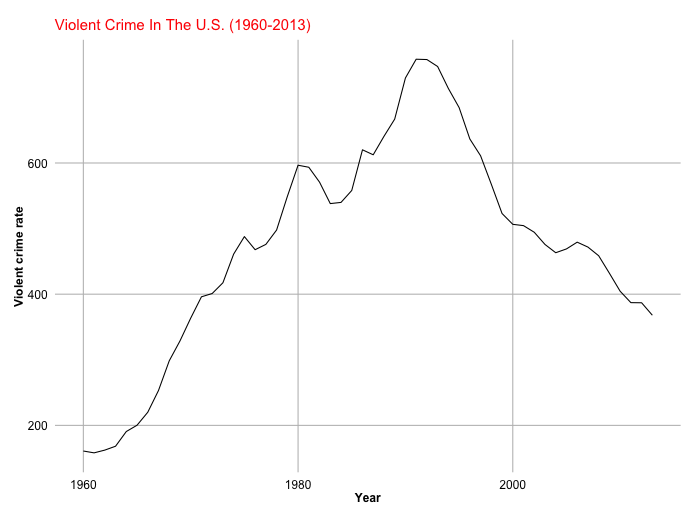The paper discusses the crime wave of the 1990's. Statistical records show that violent crime increased steadily through the 1990's, at which point it fell. Prior to the decline of violent crime in 1991, the Chicago police had reported steadily increasing violence through homicides and gang violence. In some neighborhoods, reported crime was so intense that many cases went unsolved by the Chicago Police Department. Similar trends were being noticed around the country in other cities such as LA and New York.

As you can see from the graph, crime steeply declined after 1991. This decline was largely attributed to the use of incarceration, the growth of the police force, the improved policing strategies, the decline of the crack cocaine trade, the strong economy, and increased spending on security systems. Despite these possible explanations, these trends had been going on for over two decades in the areas affected. This is what Levitt and Donohue researched in their 2000 paper.
It is well-known that children born to low-income families incapable of sustaining them are more likely to go into a life of crime. Thus, Donohue and Levitt found that the decline in crime rates in the 1990's can be attributed to the lower number of children born to these low-income families. Children born in the early 1970's were of prime crime-committing age in the 1990's. Since following Roe v. Wade more children were aborted in these poor families, less children grew up to become criminals. Their evidence is further supported by the fact that states which legalized abortion shortly before Roe v. Wade saw a decline in crime before other states which followed the Supreme Court decision of 197.
This research provides an interesting perspective on the impact of legalized abortion in the United States, which can be applied to today's discussion of the issue. Despite their findings, they have also come under significant criticism from other researchers who refute their findings. Levitt and Donohue gained a lot of recognition and reputation for their provocative and enticing paper. More of Levitt's work can be found in his book, co-written with journalist Stephen Dubner, Freakonomics.
Sources:
http://www.nber.org/papers/w8004
http://www.nber.org/papers/w15098
https://www.brennancenter.org/blog/americas-faulty-perception-crime-rates
http://www.npr.org/2014/07/30/336468325/during-chicagos-1990s-crime-wave-a-rush-to-judgment
Wow- I've never thought of how abortion could have such a strong effect on crime. I found it particularly interesting how Levitt and Donohue came to this conclusion through their analysis of lower-income families. Just curious, did they happen to come up with a number regarding how many abortions came from each economic class? How much evidence did they use to back up their case? I feel like while abortion may have played a role in the crime rates, other factors, such as the general economic climate of the 1970s versus the 1990s, also greatly affected these numbers.
ReplyDeleteNice post, this is a good piece of evidence that supports pro-choice. Something to remember is that if you get rid of abortions, it becomes a crime to have one and the amount of abortions that occur don't decrease very much (arguably). However, the amount of unsafe abortions does increase, which also impacts the health and safety of people along with crime rates.
ReplyDelete